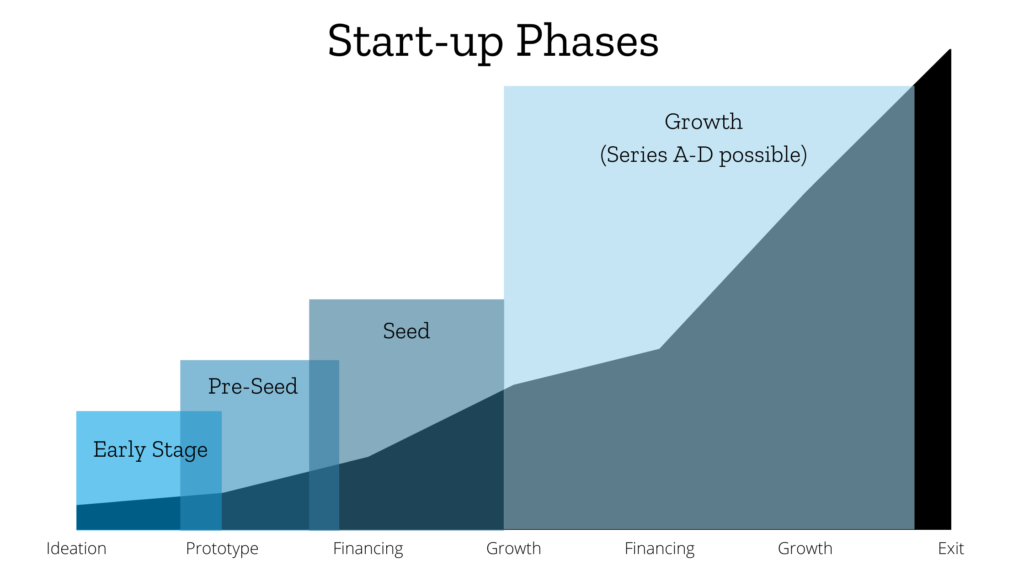Startups are usually searching for support to get started with their business idea. Sooner or later, most of them are looking for a startup incubator or accelerator. Yet, it is not always clear where the difference is between an incubator and an accelerator. Let’s bring some light into the darkness.
The Different Stages of a Startup
What makes it difficult to distinguish between accelerators and incubators is that both have the same goal: helping startups grow. Thereby coaching in different disciplines is the core of both. With books like The Lean Startup, focusing on agile methods became a popular way to show founders how to do this. Therefore different startup supporters usually have an agile growth mindset.
In order to explain different startup supporters, it’s essential to describe the journey a startup is going through. At the beginning of every journey, there is an idea. If the founder starts analyzing it and turning it into a business model, he/she is in the early stage of his/her founding process. In the following so-called pre-seed phase, the founder map out a business model and plan. At this point founders usually start applying for public funding provided by a city or state. Alternatively, some founders collect money from friends and family or invest their savings.
As a next step, the startup goes into the seed phase. It officially establishes a company by building a GmbH or similar. At this point, startups are looking for investments, e.g. angel investments or venture capital, to grow the business. A Seed-Funding round is usually under 1 million up to 2 million Euros (however, you are quite lucky to hit this number). Subsequently, Series A, B, and C can follow, usually backed by Venture Capital. Series D refers to a merger or acquisition and is therefore not a typical financing round but could also be counted in.

Startup support programs offered by incubators and accelerators usually aim for early-stage, pre-seed, and seed phases. However, sometimes they are also designed for a later stage f.ex. in preparation for a series A funding.
What is a Startup Incubator?
In general, a startup incubator
- supports startups in an early stage or in the pre-seed phase
- provides coaching, mentoring, and infrastructure
- focuses more on individual needs
- accompanies founders during their business development
- can support financially
The word incubator initially describes a device that hatches eggs or cares for premature babies. Hence, business incubators are focusing on a very early stage in the founding process. Accordingly, many incubators make it their business to connect the founders to a startup ecosystem to help them get in touch with various supporters. This can be potential mentors and investors, co-founders, or simply the ecosystem of the respective city or region.
A startup incubator is usually an environment that helps founders and startup teams to push their business ideas forward. They can be run by a state or private institution that wants to foster promising innovations. For example, institutions like T-Systems or ESA have incubators for their special niches. Additionally, many universities have startup incubators to promote students on their way to self-employment or establishing a startup. Incubators support startups primarily through a mix of mentoring, coaching, infrastructure, access to an ecosystem, and sometimes even financially.
As every incubator is different, you need to find the one that offers the best for your needs.
HHL DIGITAL SPACE as an example for a Startup Incubator
At HHL DIGITAL SPACE, we support entrepreneurs and startups by providing infrastructure, realizing collaborative workshops, networking events, and advising startups with applications for the EXIST Startup Grant. Our founder support’s core is a structured 12-week startup incubation program focusing on the problem-solution fit of their business models.
That means we are focusing on the early stage. This is special because we are helping startups before they are even ready for the pre-seed and seed phase by showing how to research and validate the problem they are trying to solve and refining the product/service that solves this problem.
We believe that evaluating your idea at the very beginning of the founding process will prevent you from investing a lot of money in the wrong places. Having a solid problem-solution fit and a good idea of what your competitors do is the basis of an effective business model, which helps you to convince Investors for the next steps.
In order to get funding, Jonathan Cordero from Caesars Business Angels says:
“Have a clear understanding of your business model, a well-grounded road map and show us how committed you are.”
When we talk about first negotiations with investors and getting funding, we talk about the seed stage. This is usually where an accelerator comes into action.
What is a Startup Accelerator?
A startup accelerator
- supports startups in pre-seed, seed, and Series A phase
- helps startups to grow faster through intense coaching
- connects startups to investors
- provides infrastructure, such as a workplace
- can support financially
As the word indicates, accelerators are designed to help boost a business’s growth in a short period of time. They support startups around the seed investment phase when it’s their goal to grow the business. That means that the business model and plan are already in place and that the product launched or will be launching very soon. An accelerator program can help startups do this faster through intensive coaching by various experts.
Startups have to apply for an accelerator program to become part of one. They are more likely to provide financial support, but that comes not always for free for the startups; sometimes, it’s in exchange for shares.
SpinLab – The HHL Accelerator as Example of a Startup Accelerator
SpinLab – The HHL Accelerator is an example. It helps startups in their pre-seed and seed phase to get coaching in various disciplines and get connected to investors. The SpinLab program is designed for 5 months and focuses on e-health, smart city, and energy. For the program’s time, the startups have a workplace in the Baumwollspinnerei Leipzig, which provides them with access to meeting rooms, various events, and coachings. Even a kitchen and kicker table are not missing. On top, the startups are getting financial support without giving equity.
Summary
To wrap it up: an incubator is helping startups from an early stage to their pre-seed stage, whereas accelerators support them in the pre-seed, seed, and sometimes Series A stage. Accelerators usually have intense coaching programs, while incubators have more optional workshops and events, where founders can spend more time on individual challenges and needs. But this can differ from program to program as well. Both can support financially, but not necessarily for free. Both are providing infrastructure where the founders and start-ups can work. It’s not always easy to distinguish them, and as a matter of fact, they can be very similar.
Ask yourself what do you need from a startup program? Do you need a certain skillset? Do you need access to a certain ecosystem? Also, think about when do you need it? If you are still in your ideation phase, it’s probably too early to get in touch with investors, and you need to focus on other aspects first.
You can also run through more than one program. As for our examples, startups that attended the incubation program of HHL DIGITAL SPACE and got support in their early-stage can apply for SpinLab – The HHL Accelerator afterwards. In this sense, these two programs are built upon each other.

